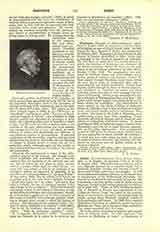

Chezy, ANTOINE-LEONARD DE, a French Orientalist, b. at Neuilly, January 15, 1773; d. at Paris, August 31, 1832. His father was an engineer, and he was originally destined for a scientific career, but he preferred linguistic studies, and devoted himself to Arabic and Persian under Sacy and Langls. In 1799 he was appointed assistant librarian in the department of manuscripts of the Bibliotheque Nationale. Attracted by the Sanskrit manuscripts, he was the first Frenchman who took up the study of India‘s sacred language, though he had neither grammar nor dictionary to assist him. When, in 1814, the first professor-ship of Sanskrit in Europe was established at the College de France, Chezy was called to the position. Many of the foremost European Sanskritists were his pupils, among them Burnouf, Langlois, Loiseleurslongchamps, and Lassen. In 1805 Chezy married Wilhelmine Christiane von Klencke, better known as Helmina von Chezy, an authoress of some reputation. The couple separated after five years.
He is the author of numerous editions and translations of Oriental works. In 1807 appeared “Les Amours de Medjnoun et Leila”, a translation of Jami’s Persian poem “Laila u Majnun”. “La Mort de Yadjnadatta” (Paris, 1814, and again, with Sanskrit text, 1826) is a translation of a well-known episode of the Ramayana, describing the slaying of a hermit by King Dasaratha (Bombay ed., II, 63). A translation of another episode from the same poem, the fight of Lakshmana with the giant Atikaya (VI, 71), appeared in 1818. Chezy’s most notable work, however, was the publication in 1830 of Kalidasa’s famous drama, “Sakuntala”, under the title “La reconnaissance de Sacountala”. This was the first time that the Sanskrit text of this masterpiece was printed. Other works of his are an analysis of the Meghaduta (1817), “Anthologie erotique d’Amarou”, a translation of the “Amarusataka”, which appeared under the pseudonym of Apudy in 1831, and “La theorie du Sloka” (1829), a disquisition on Sanskrit metre. Besides this he has left much work in manuscript.
ARTHUR F. J. REMY

